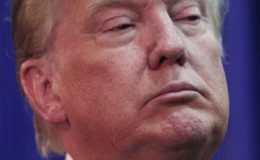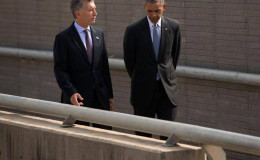What happened in Brazil wasn’t close to a ‘coup’
Contrary to what former Democratic presidential hopeful Bernie Sanders and other members of the U.S.
Contrary to what former Democratic presidential hopeful Bernie Sanders and other members of the U.S.

The big question this week among Trumpologists — practitioners of the new science of trying to decipher Donald Trump’s sequences of half-sentences that pass for speeches — is whether he has softened his rhetoric on immigration.
Now that Venezuelan President Nicolas Maduro seems to be closing all avenues for a peaceful resolution of his country’s crisis, the international community should put some serious pressure on him to allow a constitutional referendum this year.

Judging from the disastrous news surrounding the Rio de Janeiro Olympics, the best thing that could happen to Latin American countries—or perhaps to all countries that apply to be hosts of future Olympic Games—is to lose their bids, and save themselves from a monumental waste of money.

I learned in journalism school that what you see often is more important than what you hear, so I decided to turn off the television volume during much of the Republican National Convention that proclaimed Donald Trump as the Republican’s presidential candidate, and to take notes.
LONDON — After several decades of covering Latin American affairs, I’m pretty used to seeing developing countries that are deeply divided over where they should fit in the global scene.
While most of Latin America is shifting to the right, there is a potential exception that may soon keep US policymakers awake at night: the possibility of a populist leftist victory in Mexico’s 2018 elections.
Peru’s pro-business President-elect Pedro Pablo Kuczynski won his country’s elections by a hair with the last-minute help of a leftist party, but — judging from what he told me in an interview — he won’t budge on his criticism of Venezuela and other repressive regimes.
Pope Francis is very popular around the world, but there are growing signs that his popularity is dwindling in his own country, Argentina.
What a shame. The historic decision by Organization of American States chief Luis Almagro to call for an official regional discussion on Venezuela’s break with democratic rule may be derailed by a group of countries that say they support democracy, but are really buying time for the Venezuelan regime.
Donald Trump might be a xenophobic and racist demagogue, but the people who chant “Viva Mexico!”
When Argentine President Mauricio Macri recently blessed his foreign minister Susana Malcorra’s candidacy for secretary general of the United Nations, the joke in Argentina was that the country already has a Pope (Francis) and the world’s best soccer player (Lionel Messi) so it was only natural that it should seek the top UN job.
Judging from what Brazil Foreign Minister Jose Serra suggested in an interview, Latin America’s biggest country will make a major change in its foreign policy: It will no longer be an unconditional supporter and ideological ally of Cuba, Venezuela, and other authoritarian regimes.
Here’s some good news from Latin America: Much of the region’s economy may recover sooner than expected.
Judging from the latest primary results and new polls that have just come out, I have a growing feeling that Latinos will save America from Donald Trump.
Here’s what’s most remarkable about Peru’s April 10 first-round election, which will result in a June 5 runoff vote between Keiko Fujimori and Pedro Pablo Kuczynski: Nearly 80 per cent of the people voted against a Venezuelan-like leftist-populist model.
The Panama Papers, a massive leak of 11.5 million documents from a Panamanian law firm that expose the ultimate owners of thousands of shell companies, have drawn a lot of public attention in recent weeks, but I’m just as intrigued by the lesser-known Bogota Papers.
There’s a little-noticed development that says a lot about the rapid demise of Latin America’s leftist populist bloc: Brazilian President Dilma Rousseff’s government is falling apart, and none of the region’s major diplomatic groups is coming to its rescue.

President Obama charmed Argentines by dancing the tango during his visit to the South American country recently, but his trip may be remembered for something much more important: It may mark the start of a new cycle of much closer US-Latin American ties.
People will assess the impact of President Barack Obama’s historic trip to Cuba for years to come, but a long conversation with Cuba’s oldest and best-known human-rights leader shortly before the US president’s visit left me skeptical that there will be significant changes on the island anytime soon.
The ePaper edition, on the Web & in stores for Android, iPhone & iPad.
Included free with your web subscription. Learn more.